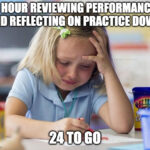Despite having plenty of cash in reserve, the college is heading for a budget deficit this financial year.
The cost of delivering core services to members outweighed the RACGP’s revenue from membership and exam fees, conference tickets and sponsorship deals by about $700,000 last year.
This financial year the deficit will run into several million dollars, despite the college axing around 50 jobs.
The budget measures were unveiled in a snap press conference featuring RACGP CEO Paul Wappett, president Dr Nicole Higgins and board chair Dr Lara Roeske on Tuesday night.
“This is about ensuring for members that we have a lean and nimble RACGP and that the college is focused on members,” Dr Higgins said.
As GP training program positions are funded by the federal government, those jobs were spared in the cull.
The 50 positions to be cut represent about 15% of the college’s non-training workforce.
The layoffs will begin this month, and Mr Wappett expects that by May the college will have a new structure.
With roles in AGPT still unfilled, there was talk that some of the laid-off staff could be redeployed to training roles.
According to Mr Wappett, the main culprit is covid-19.
“The pandemic really disrupted business as usual for us,” he said.
“We had to put more resources into advocacy and into developing resources for members so that they could treat their patients and serve the community, but the revenue from some of our core activities like exams and events and conferences declined.”
Dr Higgins said the college had also had to invest a fair amount of capital in things like the online exam platform and developing CPD.
“Many of those activities are now being completed, so now is the opportunity to trim the organisation and then set us up for getting back in in the black in the future,” she said.
That said, the college did bank around $3.7 million in JobKeeper payments in the 2019-20 and 2020-21 financial years, as well as an additional $2.7 million in research, grants and donations over that time.
It’s understood that any surplus it made during those years went into its cash reserve, which Mr Wappett said now stood at over $10 million.
“Last year, we ran a small operating deficit,” he said.
“We also had … accounting treatments when we were consolidating, for example, GP Synergy’s operations into our financial statements.”
On paper, that meant the college as a whole returned to surplus last year, even though core operating activities of the membership have been running at a deficit for several years.
Along with the job cuts, the RACGP will also be tightening the purse strings on controllable costs like travel, professional services and consulting fees.
Mr Wappett also foreshadowed the college “diversifying” its revenue streams to earn more money.





